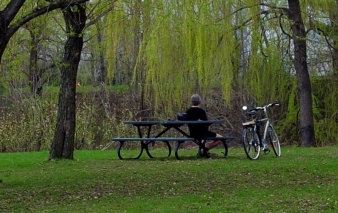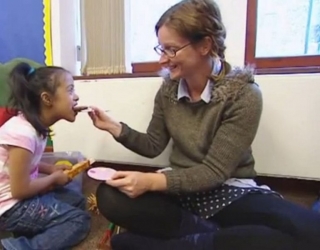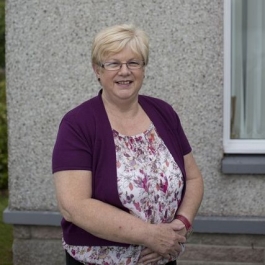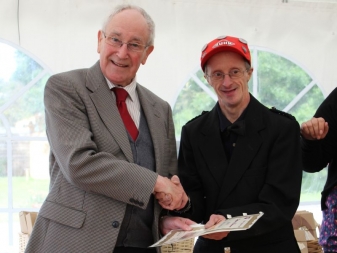Voice’s Old Susannah takes a look over the past week’s events in the ‘Deen and beyond. By Suzanne Kelly.
Spring has sprung; all is well; everything is vibrant and dynamic in the Deen and elsewhere. (If you don’t have any benefits or are on a low income – then welcome to what the media has dubbed ‘Black April’. Maybe this means we’re all going to be in the black soon?)
First of all, I had the most wonderful weekend in years – if not ever – down in Chichester. Willows Animal Sanctuary and Mount Noddy animal centre were charity beneficiaries of a benefit concert featuring four bands. If we had things like this here, we’d be the undisputed chief city of culture.
The opening act, Basis, was very impressive: not least because they were aged 12 – 15. They were all fantastic, but the leading vocalist was great, and the girl on bass was quirky, talented and had serious stage presence for someone so young.
If people their age are writing rock music like this, then rock lives. They were followed by a jazzy duo called Acoustic who were again highly talented.
I didn’t know what to think in advance of the next act up, Deborah Bonham.
I always disappoint myself for expecting impossibly high standards from some performers. By the time her set was finished, I felt as if I’d been emotionally clobbered, totally uplifted, enlightened, made tearful and joyful on a wild roller coaster ride at warp speed.
She is undoubtedly the sister of the late, great, unequalled John Bonham. Deborah Bonham is also undisputedly a performer with a spirit and strength completely of her own making. There is a new album out, Spirit. Buy it. And whatever you do, go see her live. She should be in Kinross on 5 May. Expect a proper album review from me shortly.
Then there was a set from Paul Rodgers.
I’d seen him in Bad Company in the 70s, in a few mega concerts in Madison Square Garden in the 80s and 90s with the Firm (Jimmy Page, Tony Franklin and Chris Slade). The voice is still note perfect, and I genuinely think he was having a great deal of fun.
The audience was wild. The entire place was singing ‘All Right Now’ – the final encore. Rodgers’ duet with Bonham was astounding. Money was raised; awareness was raised.
The real backbone and driving force behind the night was undoubtedly Cynthia Kereluk, Paul’s wife. I’m reasonably certain she was in two places or more at any given time – on stage doing the main auction; running the silent auction; taking payments for items won, socialising and making sure things ran smoothly. It should be noted that a main reason that Paul and Cynthia are involved is none other than local girl Sandi Thom, who grew up near Willows, and is a long-term supporter of this great charity.
these people are all committed animal lovers who gave up their time, money and possessions happily
Let’s just say Old Susannah had the time of her life while helping in some small way to help Willows and Mount Noddy. Believe it or not, it is possible to throw a great musical event without backing dancers, 27 costume changes or artists flying around the space on wires. You just need talent.
You may well wonder why a concert for Willows was taking place at the opposite end of mainland Britain; fair question. The answer lies with Willows patrons, Paul Rodgers and his wife Cynthia Kereluk. The Chichester concert is a yearly event, but now with the new Willows patrons on board, the artists involved graciously decided to raise funds for them as well.
Many of the auction items were the artists’ own treasured personal mementos; these people are all committed animal lovers who gave up their time, money and possessions happily. Again, this old cynic was moved.
A lovely lady named Hazel knitted a legion of beautiful scarves and gifts; her husband ensured everyone (including me) had transport to wherever they needed to be. The audience were treated to a fantastic evening, and responded with great generosity and enthusiasm.
I am still overloaded with positive feelings; it is only the behaviour of Iain Duncan Smith and the ConDems and the plight of Blaikiewell’s horse sanctuary that can bring out any satirical writing in me this week.
Blaikiewell horse sanctuary may be turfed out without a new home or suitable financial help to aid the construction of the AWPR. More on this unacceptable development to follow. Thanks to those politicians and others who are starting to look into the solution: I am confident one will be found.
Time for a few definitions stemming from this week’s current events.
Black April: (modern Eng. compound noun) term given to welfare benefit cuts to be rolled out in the UK.
I hope you’ve not all got too comfortable and cosy with your high living standards, because things are going to change around here (well, for most of us anyway). The ConDems have decided that simply put, there isn’t enough money to go around.
First, there are the bankers we’ve had to bail out over sub-prime mortgage and LIBOR rate fixing scandals (A National Audit Report indicates bankers still owe us now, after repayments, fees and interest a mere £456.33bn, per http://www.guardian.co.uk/credit-crunch ).
Then there is Trident and other completely essential military defence expenses (around £39 billion per year, according to a recent BBC piece – http://www.bbc.co.uk/21271670 ). Old Susannah admits we need to spend lots on defence. At present, we only have the capacity to blow the planet up a few times over, and we need to defend all of these spare bedrooms that invading armies will covet.
Then there are those deserving multi-millionaire individuals and companies which are having a hard time sheltering money from the tax man abroad (Vodaphone apparently avoided paying £700 million in tax (best to read Private Eye for more on that story); the amount of money Ian Wood is thought to avoid in tax by moving some employees’ payroll offshore is about £15 million per year).
Then of course, there are the people who are on benefits; this costs around £207 billion pa (according to the bbc article above). This last group is of course the largest group and the most impoverished. Of all the above groups, someone’s going to have to start paying their fair share. Well, it wasn’t going to be the bankers, the military or the rich, was it?
If we don’t protect the Wood Group, Vodaphone, Trident and so on, things might get bad for the economy, as opposed to how great things are now. Here’s how the ConDems are going to solve our problems.
Bedroom Tax: (modern Eng. compound noun) – a newly-implemented tax whereby benefit claimants in the UK will pay extra tax for having more bedrooms than they ‘need’.
Is there a housing shortage? This seems likely – many wealthy people can’t have more than a few houses in the countryside and a few pads in big cities because of the demand for housing. Are you one of the selfish scroungers stopping the rich from owning more homes? Well, your hour is at hand.
A mere £14 pounds per week as a penalty for this waste of space will come out of your benefits to penalise you for your luxurious extra bedroom. Too right. I was speaking to the friend of an elderly woman on a bus this week; she had been assigned a council flat with two bedrooms (and in luxurious Tillydrone as well).
At the time she was told to take this great flat or go to the bottom of the waiting list. She foolishly took the flat, not anticipating this logical, fair tax would come in. Finally, we’re getting her and people like her to pay up. The country should be back in the black in no time.
Of course there are some factors to consider: are you sharing custody of a child who will stay with you sometimes? Are you recovering from illness and need a sick room and extra facilities? Maybe you are disabled and have a spare bedroom used for equipment/rest/carer needs? Well – who cares? You’ll all be stumping up the extra tax.
Old Susannah thinks this logic should be extended. Why have separate bathrooms, kitchens and bedrooms at all? Should older or smaller people have any big spaces at all? Couldn’t children just be kept in hallways, or perhaps we could all go back to sleeping, eating and living all together in one big (but not too big) room? Horses can stand sleeping up; perhaps we could build some human stabling. The Japanese have very trendy sleeping pods for commuters; I’m sure we could do something like that here.
I think there are more savings to be made, and I’m sure as soon as Iain Duncan Smith gets his vintage car parked at his mansion, he’ll have time to think of more great money savers. But you have to admire his greatest concept of all…
The £7 per day budget: (modern political compound noun). The idea floated by Iain Duncan Smith that it is possible to live on £7 per day – if you have to. Why wouldn’t we take budget information from a government which spends about £46 billion a year on interest payments? Read on…
Are you tired of trying fad diets that don’t work? Well, the government does want us all to avoid obesity and avoid smoking and alcohol. All they’re really doing is making it easier for us to live healthier lives; I can’t see what’s wrong with asking some people on benefits to live on £7 a day. All you’ll need to do is get a bit imaginative, and that also is a good thing.
It’s important to remember that almost everyone on benefits is some kind of a cheat, wastrel or scrounger. Sure there are some retired people who have had to spend their life savings on care/medical treatment; there are people who have been disabled from birth or from accidents. Still, it’s best just to treat everyone equally in today’s society, and it looks like Iain Duncan Smith (IDS to his friends, if any) wants to treat all on benefits equally. Seems reasonable.
I also know of a person who lost a limb. At a recent ATOS assessment, and despite their doctor previously spelling out the situation completely, they were made to undress to prove that they weren’t hiding an extra limb.
Obviously doctors can get things like that wrong, and the guy could have grown his limb back and therefore be fit for work and just shirking. Can’t be too careful at these assessment centres, and if such assessments are just a little bit degrading or humiliating, or if they deem people fit for work who really aren’t, well I guess no system is perfect.
Anyway, here are some helpful suggestions; you’ll never go back to spending as much as £7 a day again. IDS says he’s already had to do just that, and that he could do it again. Of course he could.
If you have a pet, best to just abandon it somewhere
Work out a budget. £7 a day is a massive £0.29 to spend each hour. If you don’t mind sleeping say 16 hours a day, you’ll wind up with £0.87 per hour.
Eat healthy. Water is free; make the most of it. Water is a great drink and makes a great soup. Add dandelions and other plants from the roadside. Don’t boil the water though; that will cost you. If you have a pet, best to just abandon it somewhere. They won’t wind up injured, dead, starved, or run over, and you’ll have a delicious selection of their leftover food to eat.
Avoid the bedroom tax – get someone to take a sledgehammer to your interior walls so you just have a studio flat.
Go to shopping malls. You’ll be warm, you’ll get to look at the latest fashions. You can try the goods in the mobile phone and computer shops so you’ll be up on the latest technology. Watch televisions in electrical goods shops – saves on energy at home. You’ll save on heating as you stay in the mall moving from bench to bench. You’ll be able to forage for food leftovers, too.
So, you’ll have food, somewhere warm to be, and entertainment. Bus fare could be a problem though, so best walk anywhere you need to go.
Ensure that your clothes don’t need replacing; stop using personal grooming products to save more money, and remember – newspaper makes great insulation under your clothes.
Supplement your income – do you have any extra gold or silver to sell? Tooth fillings perhaps? Get to a pawnbroker and get rid of any family heirlooms. Organ sale might not be legal here, but you can still get money for participating in medical experiments.
Better yet, or if you are IDS: fill up the Morgan classic car before you have to go a week on £7 per day. Get one of the staff to lend you some money. Go stay with a rich friend. Go on a trip representing the ConDems and get all your expenses paid. Submit expense claims for your parliamentary work.
You see? It’s really going to be easier than you think.
Next week: How to either live on £7 a day, or instead demand your elected officials show a spark of human compassion towards those in need, close tax loopholes, and stop participating in a pointless arms race.











